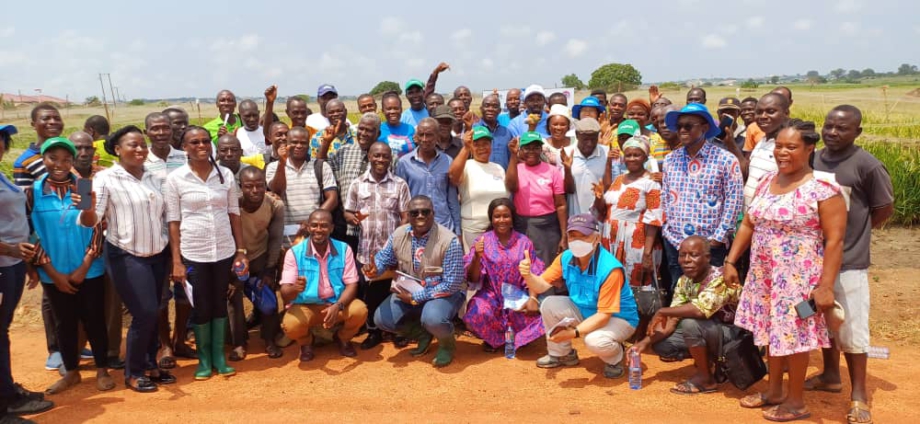Rice farmers and millers operating in irrigated schemes have expressed satisfaction about the varieties of improved seeds on the market and called for more to be made available to boost production.
They said the long grain, aromatic and have high yielding varieties had good milling quality, making the grains shiny and attractive to consumers on the market.
The rice outgrowers and processors from the Ashaiman Irrigation Scheme, Aveyime Irrigation Scheme, Kpong Irrigation Scheme and Dawhenya Irrigation Scheme, said this during a field day exhibition of some new rice varieties at Dawhenya.
The field exhibition which was organised by the Council for Scientific and Industrial Research (CSIR) - Crop Research Institute (CRI) and supported by KOPIA Ghana Centre sought to give the farmers broad knowledge about the new varieties for selection.

Jasmine-85, CRI-Enapa, CRI-Dartey, CRI-Amankwatia, CRI-Agyapa, CRI-Korea Mo, Legon-1, CRI-Onuapa, CRI-Agra Rice, CRI-Kantinka, ISRIZ-6 and ISRIZ-7 are the new varieties.
The farmers would have to select the varieties that suit their soil composition and properties so that they would get the most quality grains.
Mr Richard Martey Afleh, Chairman, Dawhenya Irrigation Project, said, they had selected Agyapa, Korea Mo, Amankwatia and Jasmine rice for their production.
"Ghanaians prefer long grains and so we chose them. Agyapa, for instance, is a promising variety and the duration for maturity is very short. It possesses all the good traits, it is long grain and aromatic and has milling quality and good panicles," he said.

Madam Catherine Norvi Sogbadzi, a rice miller and aggregator at the Kpong Irrigation Scheme, said the new varieties gave them better options as some other varieties got broken when milled.
She said: "When we mill the rice and the grains are
broken, consumers don't buy and those who buy at wholesale for onward retailing bring back the rice because it had broken."
Madam Sogbadzi said the Amankwatia rice had been largely accepted on the market, however, she added that "we don't get enough seeds of the improved varieties for planting and so this season we are looking forward to more seeds."
Dr Maxwell Darko Asante, Deputy Director, Council for Scientific and Industrial Research (CSIR) - Crop Research Institute (CRI), in his remarks said the Institute had already incorporated aroma to all the non aromatic varieties and would be tested before being given out to the farmers.
"We are improving all the aromatic varieties for resistance to rice yellow mottle virus in our bidding
programme and we would share the varieties with you," he said.
Dr Darko Asante said farmers in the irrigation scheme had not been troubled with much diseases as those in the rain-fed lowlands where, an area like Sokwai in the Atwima Nwabiagya North District, rice farms could be wiped out by rice yellow mottle virus.
KOPIA Ghana Centre is helping the rice industry with seeds and is cultivating 100 hectares of seeds for distribution across the country. One of the main challenges of the farmers in the minor season had been birds that could eat half of a hectare of farm within two or three days and six people had to be employed to scare the birds daily with each person charging Gh¢30.
Latest Stories
-
Ghana retains 10th position with lowest fuel price in Africa
3 mins -
Will Ghana’s democracy stand the test of time in the 2024 elections?
3 hours -
Hindsight: Dreams fairytale run proved one thing; it is possible
4 hours -
God makes rulers, not you; you can’t choose your successor – Mahama to Akufo-Addo
5 hours -
Contributors own SSNIT, they must decide who becomes its Director-General – Austin Gamey
6 hours -
Move away from theory-based learning towards practical learning approaches – AUCC President to students
6 hours -
Haaland scores as Manchester City beat Nottingham Forest
7 hours -
Villas-Boas elected Porto president
8 hours -
Situation on frontline has worsened, Ukraine army chief says
8 hours -
US doctor describes witnessing starvation in northern Gaza
8 hours -
CAFCC: RS Berkane make final after USM Alger refused to play 2nd leg over Moroccans’ jersey
8 hours -
Elon Musk in China to discuss enabling full self driving
8 hours -
PSG clinch Ligue 1 title after Lyon’s win over Monaco
10 hours -
Guinness Ghana sets the pace at Ghana Beverage Awards with six awards
10 hours -
Burkina Faso suspends BBC, VOA radio broadcasts over killings coverage
11 hours

